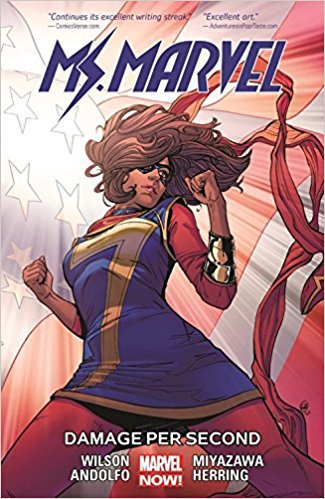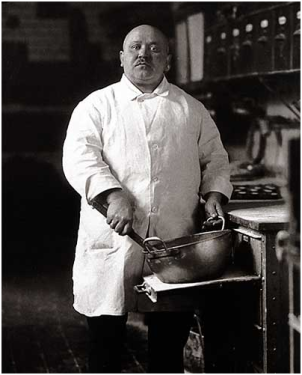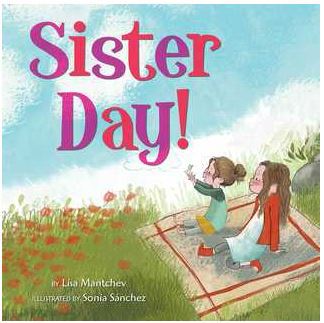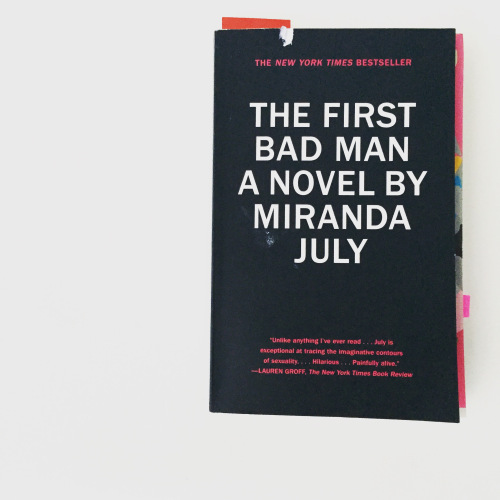if we’re having a reckoning, hey, let’s look at biography.
this is edward klein:
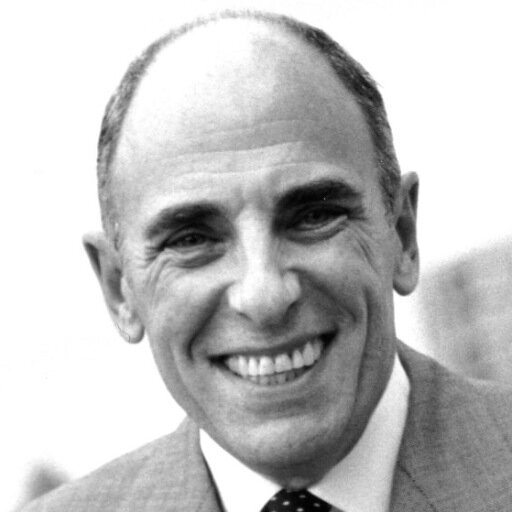
(via twitter)
we need to talk about him.
edward klein is a biographer. perhaps you know his books:

a cheerful lot. perhaps also noteworthy that ted kennedy- who at the very least was complicit in a woman’s drowning- appears to fare the best.
and, of course, the latest:
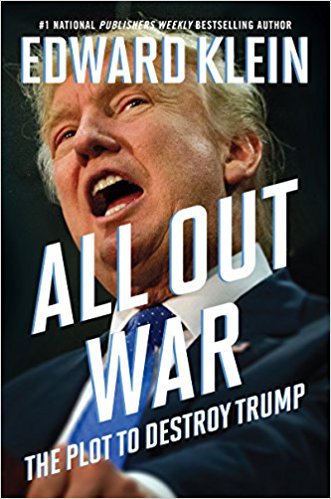
(2017)
edward klein has been eclipsed a bit by jerry oppenheimer of late but he’s in the mix and i do not want him to be overlooked.
we’re not actually talking about the sex lives of dead people here. this involves the sex lives of dead people but it is bigger that. and it opens up the issue of c. david heymann. because what edward klein creates a c. david heymann dilemma.
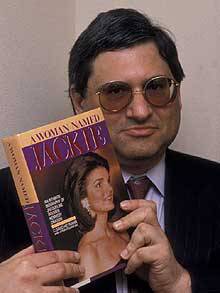
i will explain.
the c. david heymann dilemma is the problem of having a work by someone whose work you rely upon as a researcher. because they did interviews with people now dead, because their work is foundational, because whatever.
you need it because it’s doing X, Y and Z.
HOWEVER.
and this is BIG ASS GIANT HOWEVER.
that person themselves is EPICALLY problematic.
in the case of c. david heymann, because his work has been discredited time and again. and it got increasingly shoddy as his career wore on. this is why i’ve repeatedly banged on about jackie and bobby: a love story– it’s evidence is sturdy as toothpicks, but it has been used to support subsequent accounts. it is heymann who sarah bradford cites in america’s queen when she claims rfk was the love of jackie’s life.
as a researcher, when using anything from c. david heymann’s giant book on jackie, i ask myself whether i think it’s even remotely possible that it is real, whether he actually probably did interview that person and whether that person actually probably did say those things.
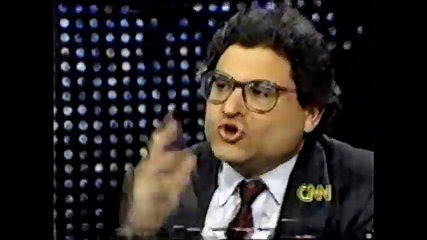
c. david heymann’s archive is a shitpile of notes that seem related to nothing he actually published in his books, so this usually involves me reading newspaper accounts of that person and trying to determine whether their speech patterns are similar to those present in heymann’s work. it also involves stringently testing his evidence against the evidence available elsewhere.
so all of heymann’s work that i use, i triple-test– which maybe should be the standard of biographical research but really isn’t.
perhaps this sounds like a niggling thing that affects only me or only people who write about jackie. um… no.
i remember seeing the book on many bookshelves at friends’ houses when i was growing up. in 1991, heymann’s book was adapted into a three-night television event with roma touched by an angel downey (incidentally one of the 45 people president donald j. trump follows on twitter).
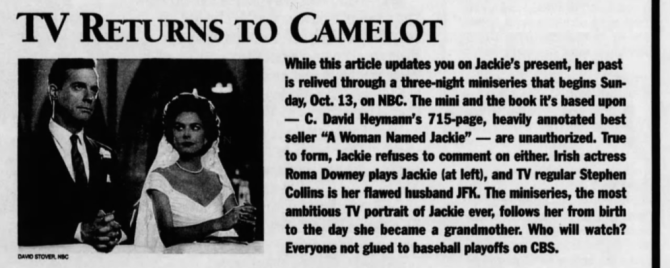
(Clarion-Ledger, 6 October 1991)

(Statesman Journal, 13 October 1991)
fyi, if you’ve read a newspaper story about jackie onassis, marilyn monroe or elizabeth taylor in the last thirty years, you’ve been exposed to c. david heymann’s work to some degree as he’s constantly used as source material in spite of his dubious ethics.
AND in spite of an industry-wide awareness of his dubious ethics and calls on simon & schuster to stop reprinting his books.
think of it like a disease. the biographical accounts of c. david heymann have been reprinted and adapted into tv films. they have infected everything from newspaper reporting, subsequent biographies and obituaries. heymann himself appeared on tv repeatedly as an expert.
the reach of this one’s man interpretations and inventions is VAST.
and that is one man.
i mention that one man because he provides a useful framework for considering the impact of all of the other men doing similar work.
(and it is worth pointing out that this is primarily men. which is not to say that men are biologically incapable of portraying a woman’s humanity in a biographical account or that women are not writing biography at this level [i will likely be refuting kitty kelley’s 1978 claim that jackie had electro-shock until i die].
it is to say that women’s writing of women’s lives tends to look a little different, primarily because it involves a wider range of interpretations as relates to women’s options and choices in life.)
enter edward klein.
full disclosure: j’adore klein’s just jackie.
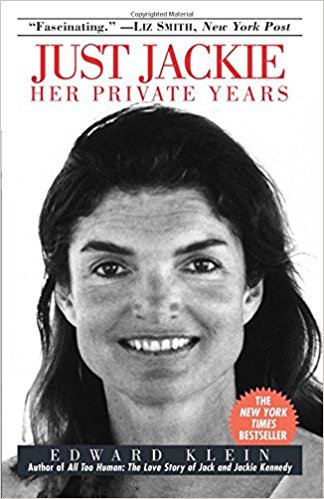
it is HORRIBLE TRASH, do not get me wrong. but what it does do it does with gusto. and it is an excellent specimen of a particular type of popular biography- which is more gossip as biography than biography as art.
there is a place for that and i have enough scholarship that i will be defending the right of popular biography to exist from beyond the grave, STILL.
my defense of it comes with a sharp awareness of the gravity of the damage it does. and we need to be talking about that more, particularly as relates to the damage it does to the stories of women.

my work researches the intersections between celebrities and culture, biography and gossip. i’m especially interested in a biographical form which lynn z. bloom has previously dubbed ‘super-pop.’ this form features extremely simplistic portrayals of the biographical subject, in terms of character, motivation and psychology. this is usually the first few biographies that comes out about a politician or the only biographies that come out about a film star. it’s incredibly close to gossip reportage but in book form. a form, incidentally, which lends its claims a gravitas of which they are usually not deserving.
super-pop isn’t an exclusively female phenomenon, but there is a crucial difference in the telling of male lives in super-pop, and that is that male lives receive a range of biographical treatments whereas women’s lives usually do not.
the story of robert kennedy is not confined to the realm of super-pop. in contrast, the story of his wife has been:

the super-pop biographies of women written by men are characterized by a malevolence of many colors.
the hatchet job klein pulled on carolyn bessette kennedy in the kennedy curse (2001), where- with very little evidence beyond hearsay- he mainstreamed and popularized the tabloid rumor that she was a cocaine addict, is noteworthy.

writing in the independent in 2004, clare longrigg noted:
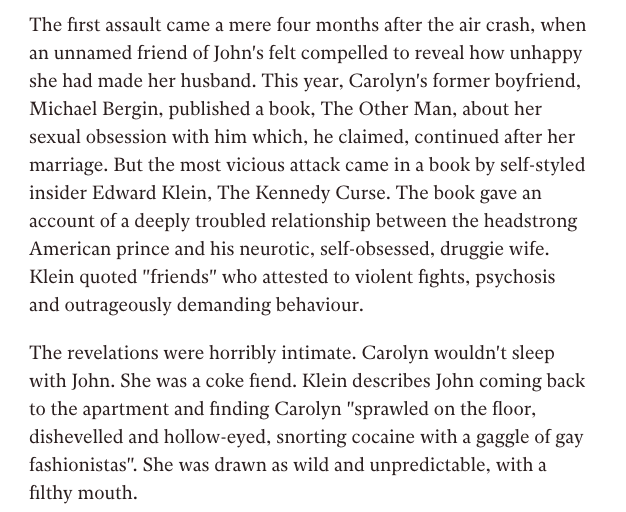
(via the independent)
wild and unpredictable. unlikeable perhaps??
rebecca traister has written about the ways in which our national narratives, particularly those relating to HRC, have been shaped by male journalists and media figures with misogynistic attitudes towards women.
it’s time we look at our biographers too.

this is the cliché: that biography is actually more about the biographer than the biographical subject.
hence, any profile of kitty kelly wonders why she writes about her subjects’ weight so much. any review of my book will probably wonder why i’m so obsessed with independence.
for awhile now, klein’s books have come under fire for being political hatchet jobs dressed up as biographies. peggy noonan declared his 2005 book, the truth about hillary, ‘poorly written, poorly thought, poorly sourced and full of the kind of loaded language that is appropriate to a polemic but not an investigative work.’
in reporting upon klein’s 2016 lunch with donald j. trump, media matters called klein’s work ‘clinton-bashing “fan fiction.”‘

biography is about the biographer and it is ideologically shaped.
hence, at the height of the women’s liberation movement, the biographer willi frischauer wrote of jackie kennedy on inauguration day: “the future was closing in on her and kept her keyed up as she approached the climax in any american woman’s life, the inauguration of her husband as president of the united states.”
because that is all? there isn’t any more?!

klein’s ideological agenda wasn’t so evident at first.
in the 1980s, he’d been a reporter for vanity fair, where he wrote about jackie. it seems he wrote some novels for doubleday so, even though his claims they were BFFs are suspect, he may’ve run into her now and then. in the 1990s, he wrote books about the kennedys that weren’t all that different from christopher andersen’s books about the kennedys, which was kind of odd.
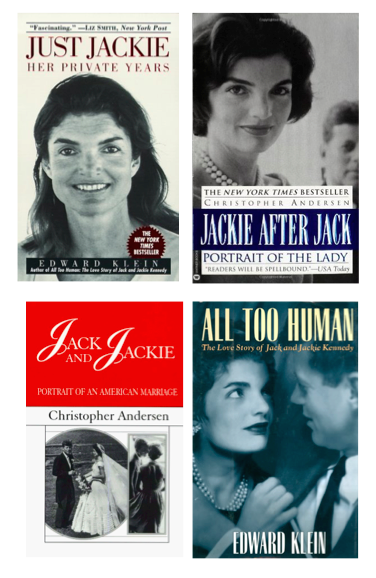
but for more than ten years now, klein has been up to something altogether else.
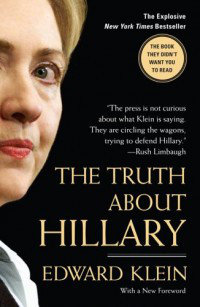
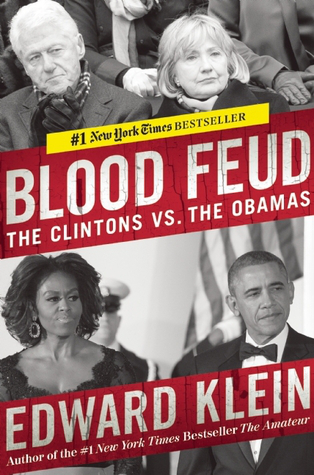
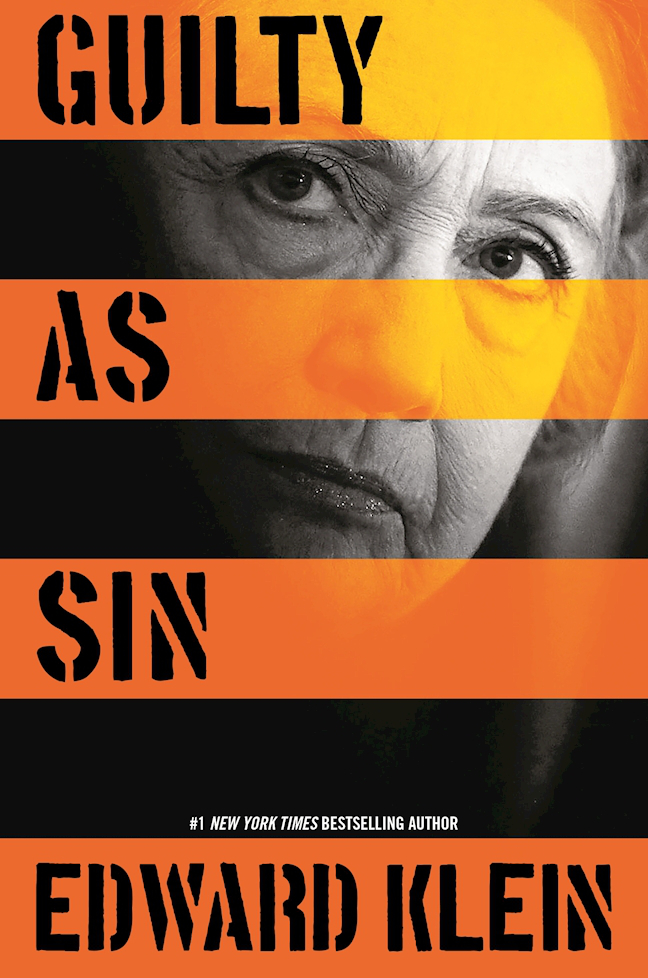
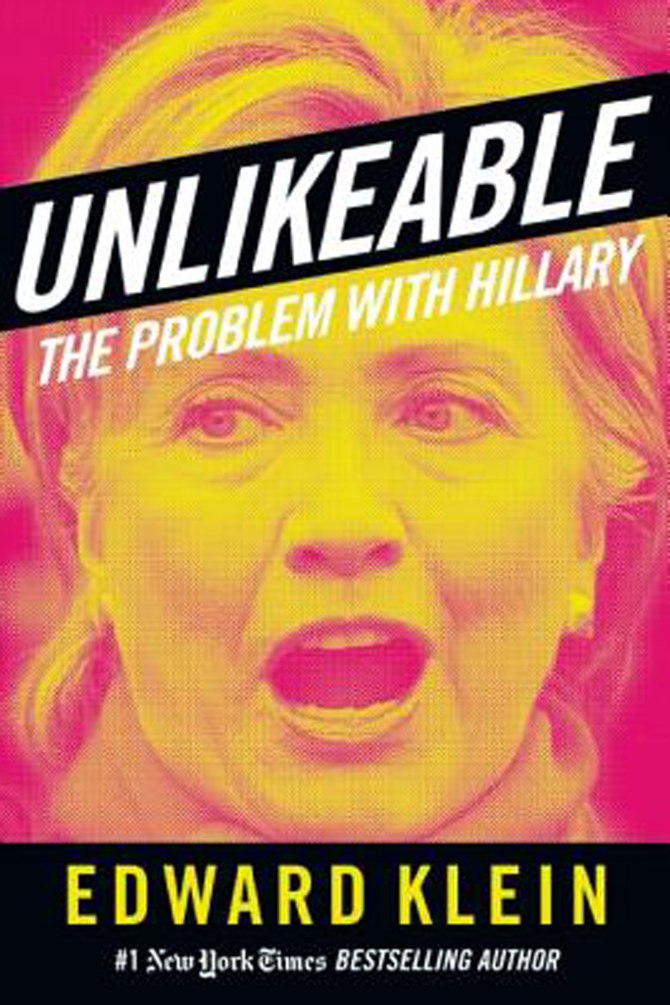


given his appearances on fox, it’s tempting to think that klein is preaching to the choir.
even rush limbaugh was skeptical about blood feud in 2014. ‘some of the quotes strike me as odd,’ he said ‘in the sense that i don’t know people who speak this way.’
to be fair, i wouldn’t say that reading just jackie i ever thought the people speaking in the book sounded like real people. that was actually the fun of reading it. the lushness and implausible detail with which the settings were described, the sheer improbability of the dialogue, which was clearly invented.
true story: in just jackie, we are told when people put their drinks down.
ain’t no way there’s a footnote for that. and ain’t no way klein could’ve known because he was not there. and who, in recounting a story to a biographer, says when people put their drinks down?
this seems harmless, because who cares if the putting down of drinks is not factually accurate. i have picked possibly the smallest sword for the fight i want to have here in pointing out something pretty insidious, but i’mma run with it.
because what klein does in just jackie- through the inclusion of such details, such inventions- is unnecessarily restrict jackie’s life to that of a domestic drama. it suggests her life was so small, so limited, that the setting down of drinks and the details of phone calls matter enormously. this is trumpeted as closeness and intimacy, just the thing we all allegedly want from biography. but also just the type of thing that we more often get in biographies of women than those of men.
this matters. for one thing, klein may have had a more profound role in shaping the french perception of the relationship between the clintons and obamas than we ever dreamed.

but also because these are the stories that circulate in our culture. klein and oppenheimer and andersen and heymann before them are called to appear on television shows, their work is cited in newspaper articles, their books are turned into movies. whether or not you choose to read them, you are encountering their work because it is out there, in ways we may not even see, because it goes uncited.
biography has sex problems. i have been writing about this for YEARS. we need to deal with it now.
Share this: